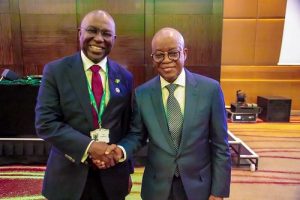NPA, PEBEC Move to Achieve Improved Ease of Doing Business at Ports, Launch Special Committee
• We’ re working closely with IMO to deploy port community system – Dantsoho
By Our Correspondent
The federal government on Thursday made strong efforts at achieving improved efficiency and ease of doing business at the nation’s seaports.
This was with the launch of the Ports and Customs Efficiency Committee (PCEC) which is targeted at ensuring efficiency and ease of doing business in Nigerian ports.
The Director General, PEBEC, Princess Zahrah Mustapha, who spoke on the occasion said that improving efficiencies at the nation’s seaports would lead to reduction in cargo dwell time, vessel turnaround time as well as turnover for shippers and other customers.
She assured that the committee will change a lot at the ports, adding that it will unlock potential opportunities which in turn will enhance the nation’s economy.
According to Mustapha the present intervention is purposeful driven and expected to bring about a lot of good results.
Mustapha said, “By improving efficiencies in our ports, we can drastically reduce the average cargo dwell time and turnover time for customers, eliminate duplication of documentation and manual processes, and ensure customers’ satisfaction.
“This is not just another one of our reforms, but this is about resilience, it’s about unlocking potential opportunities, and enhancing Nigeria’s economy. This is not just a committee made up of government force for a difference, this also has a lot of private sector stakeholders.
“It is a call to action for terminal operators to improve infrastructure and for shipping companies to increase efficiency so as to reduce delays, for freight forwarders to uphold compliance, and for regulators to reduce bureaucratic bottlenecks. It is a call for shared ownership of our shared problem and a commitment to deliver a shared solution.”
She also said that the Committee will go beyond identifying the problems, adding that it will implement the solutions.
The DG said, “Nigeria loses a lot every single day due to some of our inefficiencies. These are not just numbers, these are missed opportunities. They represent jobs not created, goods not delivered, investments not realised, and economic growth that is unnecessarily delayed.
“The Ports and Customs Efficiency Committee has been established to change this narrative, to go beyond identifying the problems we already know and begin implementing the solutions we all agree are long overdue.
“At PEBEC, our mandate has been very clear to remove bureaucratic bottlenecks that will allow people do business at Nigerian seaports. Since 2016, we have driven over 200 reforms across sectors, collaborating with ministries, departments, agencies, and private sector and since I came on board, I’ve taken it one step forward.
“So beyond passing or helping pass reforms or policies, it’s time for us to focus on implementation and practical output of what these reforms can translate into. This is why this committee is important to us.
“The Ports and Customs Efficiency Committee is not an observer group, it is an action-oriented, high-impact one, charged with driving sustainable improvement in service delivery at the Nigerian ports working hand-in-hand with agencies like the Nigerian Ports Authority, the Nigerian Customs Services, and other government agencies within the ports, technical operators, shipping companies, freight haulers, logistic providers, exporters, manufacturers, and policymakers, this is a reform ecosystem that accommodates everyone” .
The Managing Director of NPA, Dr. Abubakar Dantsoho, in his speech said his organization is presently addressing four major pillars that have been critical in repositioning the seaports in Nigeria which will ensure effective competitiveness with other regional ports.
Dantsoho identified investment in infrastructure, equipment, technology, and human capacity as among the priority of the agency, saying this will improve competitiveness and operational efficiency of Nigerian ports
According to him, port infrastructur in Apapa and Tin Can Island Ports are aged and require rehabilitation.
According to him, “Tin Can was constructed about 48 years ago, Apapa almost 100 years ago—yet no major rehabilitation has taken place all these years.”
ADVERTISEMENT
He said that the approval by th federal government for the reconstruction of both ports would improve berth depth and cargo handling capacity.
Dantsoho said that on the area of technology, the agency has been working closely with the International Maritime Organization (IMO) to deploy the Port Community System (PCS), describing this as the backbone for the National Single Window.
The PCS, according to him will eliminate paperwork and reduce human interface, adding that this will improve transparency, reduce cost, and boost efficiency and revenue generation.
ADVERTISEMENT
He said, “NPA cannot do it alone. Efficiency must cut across all segments if we are to truly optimize revenue and compete globally”.
The Comptroller General of Nigeria Customs Service (NCS), Bashir Adewale Adeniyi MFR, in his speech said efficient port remains critical to Nigeria’s logistics and trade competitiveness.
Represrented the Deputy Comptroller General of Customs in charge of Tariff and Trade, DCG C.K Niagwan, the CGC believes that for Nigeria ports to achieve its hub status all the MDAs need to be committed to drive port operations efficiently.
He said, “We have identified key challenges that have caused the inefficiencies to be severe congestion, which leads to prolonged cargo dwell time, as well as escalated logistic costs.
“Also, the ports need to be revitalized for them to be efficient and this part, being efficient, is very critical to Nigeria’s logistics, trade, competitiveness, as well as regional and continental relations, particularly under the framework of the African free Continental Free Trade Agreement (ACFTA).
ADVERTISEMENT
“There’s a need for us to implement measures that require public-private collaboration, very important, because the Nigerian government alone cannot afford to actually build on the infrastructures of the port. We need to have the private sector join us in doing that.
“We also need to have regulatory commitment, very important. All the MDAs must be committed to seeing that the ports are efficient. We also need to have sustained investment in infrastructure and technology.”
Adeniyi pointed out the challenge of overlapping functions, inadequate and obsolete infrastructures.
According to him, “We have identified key challenges that have caused the inefficiencies to be severe congestion, which leads to prolonged cargo dwell time, as well as escalated logistic costs. We have identified manual and fragmented processes that have led to delayed customs clearance and cargo inspections. We also have aging infrastructures where we have outdated cargo handling equipment and inadequate rail evacuation system.
“We have regulatory overlaps where many agencies are in the ports and their functions overlap, leading to operational delays. We have security, as well as corruption concerns, incidences of extortion, as well as unauthorized access to ports that have compromised the ports’ integrity. There are several measures that we can implement to be able to have efficiency in our ports”
ENDS.





